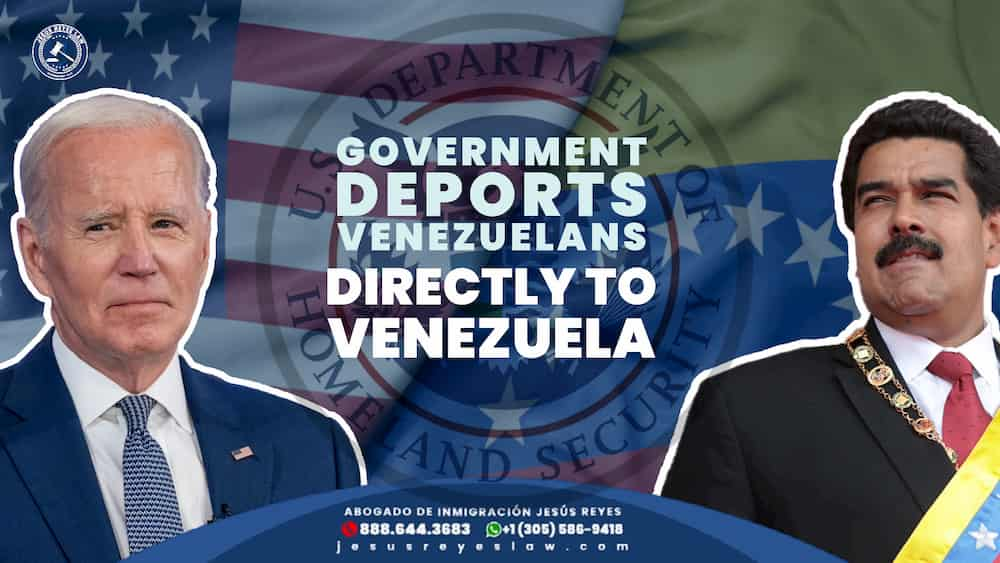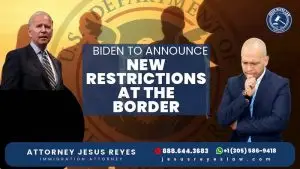The Administration of President Joe Biden has reached an agreement with Venezuelan leader Nicolás Maduro to resume the deportation of Venezuelan migrants to the South American country. This decision has generated concern among human rights activists and advocates, who fear for the safety and well-being of the Venezuelans who will be repatriated. Although the move comes in the context of efforts to curb illegal immigration at the U.S.-Mexico border, many see sending Venezuelans back to their country of origin as sending them to a situation of hunger, political persecution and utter helplessness.
The agreement between the Biden Administration and Nicolás Maduro
The U.S. Department of Homeland Security announced that the agreement with Nicolás Maduro follows the decision of Venezuelan authorities to accept the return of Venezuelan citizens. Following multilateral talks in Mexico City between the governments of the United States, Mexico, Colombia and Panama, it was agreed to resume deportations of those Venezuelan citizens who cross the border illegally and do not establish a legal basis to remain in the United States.
Increase in the number of Venezuelan immigrants at the border
In recent months, there has been a sharp increase in the number of Venezuelan immigrants showing up at the U.S.-Mexico border. According to federal government data, between July and August, around 50,000 Venezuelans were registered at the border, marking an all-time monthly record. This situation has led to the implementation of new immigration policies and increased eligibility of Venezuelans for Temporary Protected Status (TPS), which provides protection against deportation and allows them to live and work temporarily in the United States.
Crisis in Venezuela and the record exodus of Venezuelans
Venezuela is facing an unprecedented social, political and economic crisis, which has led to a massive exodus of its population. According to the United Nations, more than 7 million people have fled the country in search of better living conditions. This situation has made Venezuela the source of the largest movement of people in the Western Hemisphere in decades.
Biden Administration Policies to Curb Illegal Immigration
The Biden Administration has implemented several policies to curb illegal immigration at the U.S.-Mexico border. This includes specific programs for Venezuelans, Haitians, Nicaraguans and Cubans that allow individuals to enter the country for a period of two years, provided they comply with background and health checks, and have a financial sponsor.
In addition, the U.S. government has committed billions of dollars in investments and projects in Central America to address the root causes of migration. There have also been joint operations with Panama and Colombia aimed at stopping illegal migration through the dangerous jungle known as the Darien Gap.
Concerns and criticisms of the new immigration policy
The announcement of the resumption of deportations of Venezuelans has generated concern and criticism from activists and human rights defenders. It is feared that this measure will endanger the lives and well-being of thousands of Venezuelans, as Venezuela faces accusations of crimes against humanity in international courts, and cases of torture and extrajudicial executions of political dissidents have been documented in the country.
Some Venezuelan rights advocates believe that this ill-defined and sometimes ambiguous immigration policy has contributed to the migration crisis. U.S. government immigration and policy announcements have encouraged people to flee Venezuela, but then encounter difficulties upon arrival at the border.
Perspectives on the agreement between the Biden Administration and Nicolás Maduro
The resumption of deportations of Venezuelans to Venezuela has generated diverse perspectives and opinions. On the one hand, some consider that it is a necessary measure to establish order and law at the border, and that the process should be supervised to ensure humane and dignified treatment of repatriated Venezuelans. On the other hand, there are those who criticize that this measure strengthens the Maduro regime and point out that the U.S. government is trying to normalize relations with the regime.
Although there are no formal diplomatic ties between the United States and Venezuela, attempts at communication between the two governments have led to significant improvements in bilateral relations. The Biden Administration has offered to lift sanctions imposed by the Trump Administration on the Maduro regime if free and fair elections are held in Venezuela.
________
The Biden Administration’s resumption of deportations of Venezuelans to Venezuela has generated concern and criticism from activists and human rights advocates. Although the move comes in the context of efforts to curb illegal immigration at the U.S.-Mexico border, many see sending Venezuelans back to their country of origin as sending them to a situation of hunger, political persecution and total powerlessness. The crisis in Venezuela and the massive exodus of its population continue to challenge the international community, and the root causes of this crisis need to be addressed in order to find long-term solutions.










